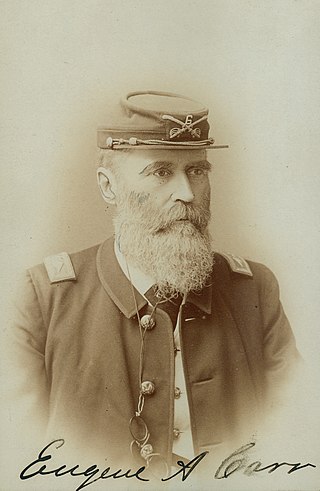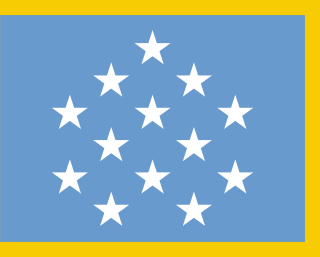This is an incomplete list of the last surviving veterans of American wars. Exactly who is the last surviving veteran is often an issue of contention, especially with records from long-ago wars. The "last man standing" was often very young at the time of enlistment and in many cases had lied about his age to gain entry into the service, which confuses matters further.

George Horace Morgan was an American cavalry officer and Medal of Honor recipient.

Eugene Asa Niel Carr was a soldier in the United States Army and a general in the Union Army during the American Civil War. He was awarded the Medal of Honor for his actions at the Battle of Pea Ridge.
William Othello Wilson was an African-American corporal in the United States Army's 9th Cavalry Regiment. He is noted for having received the Medal of Honor.
Clinton Albert Cilley was a North Carolina lawyer and judge, and a recipient of the Medal of Honor for his actions as an officer in the Union Army at the Battle of Chickamauga in the American Civil War.

John Shivers was a U.S. Marine stationed aboard the USS Minnesota during the American Civil War. He received the Medal of Honor for his actions during the Second Battle of Fort Fisher on January 15, 1865.

Franklin L. Wilcox was a U.S. sailor stationed aboard the USS Minnesota during the American Civil War. He received the Medal of Honor for his actions during the Second Battle of Fort Fisher on January 15, 1865.

Emmer Bowen was a Union Army soldier during the American Civil War. He received the Medal of Honor for gallantry during the Siege of Vicksburg on May 22, 1863.

Conrad Schmidt was a Union Army soldier during the American Civil War. He received the Medal of Honor for gallantry during the Battle of Opequon, more commonly called the Third Battle of Winchester in Virginia on September 19, 1864.
Sergeant John P. Schnitzer was an American soldier and wagoner in the U.S. Army who served with both the 23rd U.S. Infantry and 6th U.S. Cavalry in the New Mexico Territory during the Apache Wars. He was awarded the Medal of Honor, along with First Lieutenant Wilber Wilder, for rescuing a fellow soldier under heavy fire while fighting the Apache at Horseshoe Canyon on April 23, 1882, which he received fourteen years later.
John Vale was a member of the Union Army during the American Civil War. He received the Medal of Honor in 1897 for his bravery on February 15, 1863, at Nolensville, Tennessee.

Hugh Hamilton was a Union Navy sailor in the American Civil War and a recipient of the U.S. military's highest decoration, the Medal of Honor, for his actions at the Battle of Mobile Bay.

Robert Brown was a Union Navy sailor in the American Civil War and a recipient of the U.S. military's highest decoration, the Medal of Honor, for his actions at the Battle of Mobile Bay.

The Medal of Honor (MOH) is the United States Armed Forces' highest military decoration and is awarded to recognize American soldiers, sailors, marines, airmen, guardians, and coast guardsmen who have distinguished themselves by acts of valor. The medal is normally awarded by the president of the United States and is presented "in the name of the United States Congress." It is often colloquially referred to as the Congressional Medal of Honor.
Joseph Burger was an Austrian German soldier who fought in the American Civil War. Burger received the United States' highest award for bravery during combat, the Medal of Honor, for heroism during combat at Nolensville, Tennessee on February 15, 1863, when Burger was 14 years of age. He was honored with the award on September 11, 1897.
Private James Flanagan was a soldier who fought in the American Civil War. Flanagan received the United States' highest award for bravery during combat, the Medal of Honor, for his action at Nolensville, Tennessee on 15 February 1863. He was honored with the award on 11 September 1897.

John Wesley Clark was an American soldier who fought in the American Civil War. Clark received the country's highest award for bravery during combat, the Medal of Honor, for his action near Warrenton in Virginia on 28 July 1863. He was honored with the award on 21 December 1892.
Samuel Wright was an American soldier who fought for the Union Army in the American Civil War. He was awarded the Medal of Honor for his actions at Nolensville defending a wagon train. Wright was born 20 January 1828 in Plympton, Massachusetts. He fought in the 2nd Minnesota Infantry during the Civil War. He died on 7 July 1918 and is buried in Maple Grove Cemetery, Wichita, Kansas.








